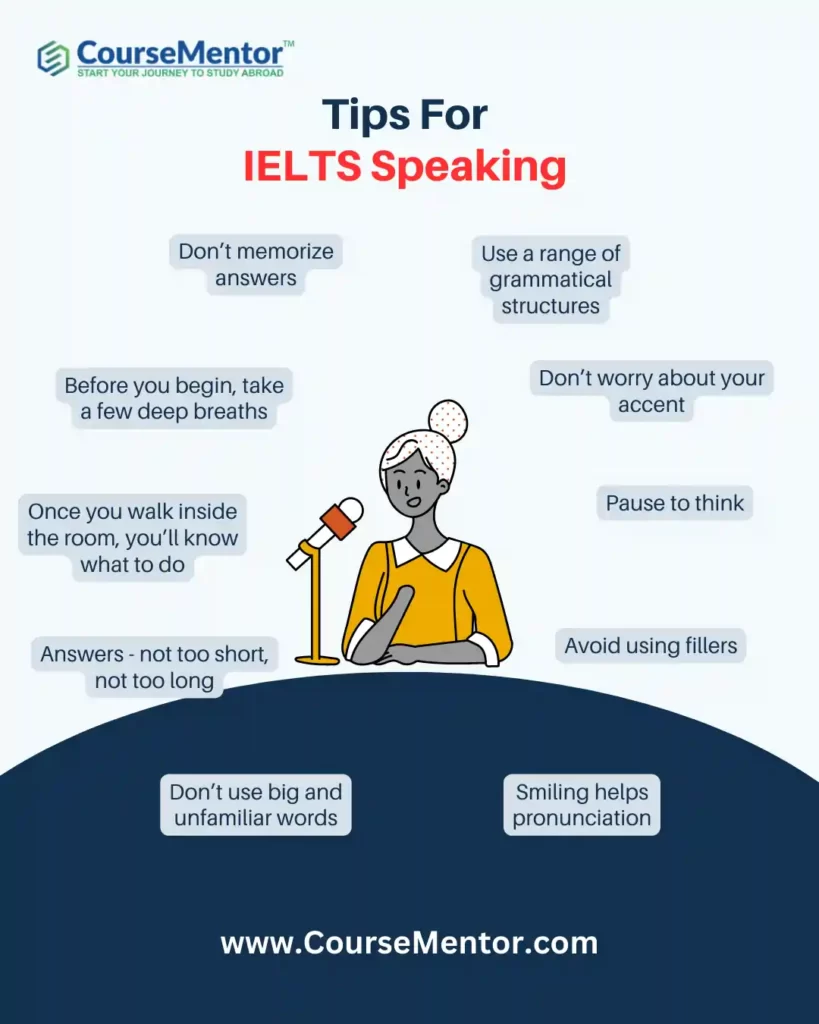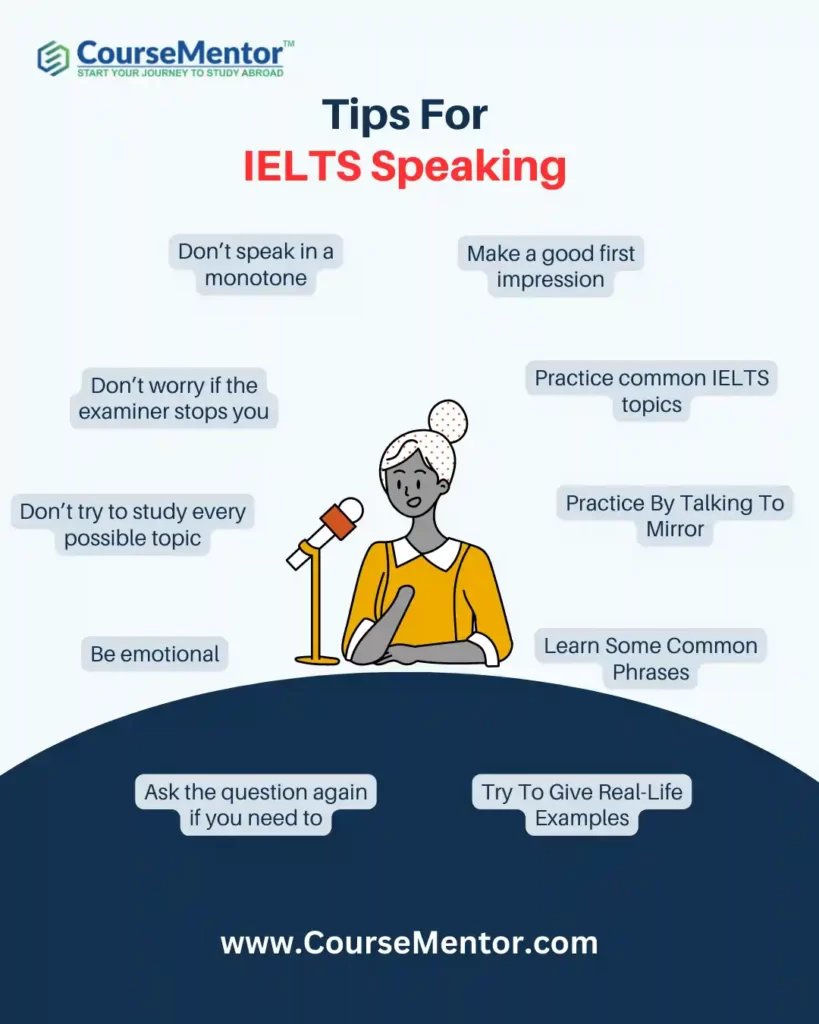IELTS is an international English language test that measures students’ language proficiency through four different modules.
- Listening
- Reading
- Writing
- Speaking
To prove their language proficiency to study or work in an English-speaking nation, students must get a good score in all four modules.
To get a good band score in all four modules, students are required to follow some specific tips and tricks.
In this blog, I will discuss the best tips for IELTS speaking that will help you get an 8-band score in IELTS speaking.
But before learning the tips, you must know on which criteria your speaking is accessed.
Let’s get started!
IELTS Speaking Marking Criteria
Your IELTS speaking is judged on the basis of four different criteria;
- Fluency and coherence
- Lexical resource
- Grammatical range and accuracy
- Pronunciation
These are the four criteria on the basis of which IELTS measures a student’s speaking. Students must keep in mind these criteria and work on improving this if they are aiming to get an 8-band score.
What Is the IELTS Speaking Test?
IELTS speaking is a face-to-face, informal conversation with an IELTS examiner. This test is the same for general training and academics.
It has 3 sections: introduction, cue card, and follow-up questions. It is designed to assess your grammar, pronunciation, fluency, and vocabulary.
Also, read – IELTS Academic vs General: Which Exam Should I Take?
Format Of IELTS Speaking Test
There are 3 parts to the IELTS speaking test:
Part 1 (about 4-5 minutes)
In this section, the examiners will introduce themselves and ask you to do the same.
The examiner will ask many general questions about your family, studies, work, and hobbies.
Part 2 (about 3–4 minutes)
In this section, the examiner will give you a cue card with any topic and some questions to cover in your speech.
The examiner will give you one minute to prepare for the cue card topic, and he will give you blank paper and a pencil to make notes.
After you’ve finished thinking, you will have to 1 to 2 minutes to speak about the cue card topic.
Part 3 (about 4–5 minutes)
A two-way conversation. The examiner will ask more questions about the topic presented in Part 2 of the Speaking test.
You can make use of this opportunity to discuss other ideas.
IELTS Speaking Test Information
- The speaking test is a face-to-face speaking test in a room with an examiner.
- For all candidates, there is only one speaking test. The speaking test is the same for academic and GT candidates.
- Even though you are taking IELTS online, you will have a face-to-face interview with the examiner. For everyone, the speaking test is the same.
- It’s recorded, so you can ask for a remark later if you like.
- This is an informal speaking test.
- At the end of the test, the examiner who asked the questions will determine your results.
- The test takes between 11 and 14 minutes to complete. The examiner controls the duration and length of your answers.
Also, read – PTE Exam Pattern 2022 – Get 85+ Scores in PTE Exam
Tips For IELTS Speaking
Here are the best tips for IELTS speaking to help you improve your band score:
- Don’t memorize answers
- Before you begin, take a few deep breaths
- Once you walk inside the room, you’ll know what to do
- Answers – not too short, not too long
- Don’t use big and unfamiliar words
- Use a range of grammatical structures
- Don’t worry about your accent
- Pause to think
- Avoid using fillers
- Smiling helps pronunciation
- Don’t speak in a monotone
- Don’t worry if the examiner stops you
- Don’t try to study every possible topic
- Be emotional
- Ask the question again if you need to
- Make a good first impression
- Practice common IELTS topics
- Practice By Talking To Mirror
- Learn Some Common Phrases
- Try To Give Real-Life Examples

Don’t Memorize Answers
Don’t memorize answers, especially in Part 1. The memorized answer does not assess your English language skills to the examiner.
If the examiner finds that you are memorizing your answers, your band score may be affected. It is the second tips for IELTS speaking.
Before You Begin, Take A Few Deep Breaths
Whenever you enter the examiner’s room, your heart will race. That’s why before you enter the room, take a few deep breaths to get your heart rate back to normal and calm yourself down.
Once You Walk Inside The Room, You’ll Know What To Do
All you have to worry about is speaking once you enter the room and sit.
Everything you need to know about the rest of the process will be given to you by the examiner.
So don’t be worried about anything at that time. It is the first tip for IELTS speaking.
Answer – Not Too Short, Not Too Long
Your answer should be 1 to 2 sentences long. You should not give the answer of yes/no.
Answer the question directly and give a little more information as a general purpose: for example:
Question: Do you like to study by yourself or in a group?
Answer: I prefer to study alone (direct answer) because it allows me to focus better and accomplish more. (extension)
Also, read – Top 17 IELTS Writing Tips To Get 8+ Band Score
Don’t Use Big And Unfamiliar Words
In your Speaking test, you might want to use big, difficult words to impress the examiner. However, if you want to be safe, avoid using unfamiliar words.
It’s more likely that you’ll make a mistake by mispronouncing words or using them incorrectly. Your final band score can be affected by mistakes.
Make use of a variety of words that are appropriate to the topic being discussed. It is the fourth tips for IELTS speaking.
Also, read – IELTS exam syllabus 2022 – CourseMentor
Use A Range Of Grammatical Structures
When IELTS examiners assess your speaking abilities, they look at the following criteria:
- Fluency and coherence
- Lexical resource
- Grammatical range and accuracy
- Pronunciation
Use grammatical structures and simple sentences to explain your answer. Prepare your mistakes for this record yourself to see where are you mistaking. You can also speak english with your friends and family. it’s crucial to practise speaking in the past, present, and future tenses. It is the fifth tips for IELTS speaking
Don’t Worry About Your Accent
Face-to-face communication, unlike an AI machine, the IELTS examiner recognizes a wide range of accents and will understand what you say during the speaking test. There is nothing to be concerned about if you can communicate well. However, because English is a stress-timed language, be conscious of sounds that you struggle with and make sure to use stress and intonation. If you practise with friends, they will let you know if they don’t understand you. It is the sixth tips for IELTS speaking.
Pause To Think
We all do something when we’re trying to figure out how to answer a question. There’s no harm in pausing for a moment to consider what to say. You might use sentences like: to give yourself time to consider throughout the Speaking test.
- That is an interesting question.
- I’d never thought about it before, but…
- That’s a tough question, but I’ll do my best to answer it.
- Let me think that for a while.
- Let me see
- That’s a good point
Avoid Using Fillers
Avoid using filler words and speak with confidence. When we don’t know what to say, we usually use fillers. However, this shows the examiner that you don’t have access to the relevant vocabulary or ideas; therefore, it’s vital to avoid them and instead use the phrases we provided in Tip 8.
Avoid the following fillers:
- Like
- You know
- Umm…
- Ahh…
- Well
- Yeah…
Smiling Helps Pronunciation
Smiling can help you relax, which can improve your pronunciation. Enunciate clearly by opening your lips wide enough for sounds to come out clearly. When we smile, our lips expand, and our speech takes on a more welcoming tone. The examiner will see that you can use a variety of pronunciation qualities if you use clear diction and tone. It is the ninth tips for IELTS speaking.
Also, read– 11 Tips On How To Crack IELTS To Get 8+ Band Score

Don’t Speak In A Monotone
We can make a dull, monotone sound with little variation when we speak. This makes it more difficult to communicate yourself and the listener to figure out which parts of your message are most vital. Make your conversation with the IELTS examiner more engaging by emphasizing specific words and pausing at key points in your speech. By stressing crucial words, we can make it easy to compare and contrast ideas. It also improves the flow of conversation, so keep this in mind:
- Don’t speak in a monotone
- Vary the stress and intonation to add emphasis
Don’t Worry If The Examiner Stops You
Because the examiner is on a tight schedule, they may stop you during the speaking task to keep the test moving quickly.
Stopping by the examiner may be interpreted by many students as a sign that they’re doing something wrong. But don’t panic; if the examiner stops you, it’s not a reflection on your ability to speak; it’s simply a part of the exam. It is the eleventh tips for IELTS speaking.
Don’t Try To Study Every Possible Topic
You have no idea what questions will be asked of you, but that shouldn’t be a problem. All of the topics can be related to your life in some way. So all you have to do now is share your personal experiences. It is the twelfth tips for IELTS speaking.
Be Emotional
Give the speaking test with emotions. The tone of a speaker’s speech is what separates an experienced speaker from a beginner. Express yourself as if you were speaking in your tongue.
Ask The Question Again If You Need To
If you need something clarified, don’t be afraid to ask. You will not lose a point for asking the examiner.
Make A Good First Impression
Have faith in yourself. It’s important to look nice, smell good, and feel well. Although it may not appear important, a positive first impression can go a long way.
Also, read – Best 14 IELTS Reading Tips You should Learn
Practice Common IELTS Topics
Part 2 of the IELTS Speaking test requires you to talk for approximately 2 minutes on a particular topic. To improve and learn vocabulary connected with each topic, practise with friends, family, or colleagues on frequent IELTS topics.
The following are some examples of topics on which you can prepare for the Speaking test:
- Tourism and travel
- Education
- Transport
- Environment
- Family life
- Sport and recreation
- Crime and punishment
- The internet
- Advertising and retail
Practice By Talking To Mirror
While practicing for the IELTS exam, always try to practice while looking in the mirror. This trick is very helpful in building up confidence. In the beginning, you may feel hesitant while talking to yourself, but once you get familiar, you will see that you won’t hesitate while speaking in front of others.
Also, never miss any chance to speak in English. For example, don’t fear speaking in English with friends or in any social gathering.
Learn Some Common Phrases
Another one of the best tips for IELTS speaking is learning some common phrases. When you use phrases in IELTS speaking, it will look like you are comfortable speaking in English.
The use of phrases shows that you are speaking in English confidently. The use of phrases in speaking helps you speak like a native English speaker.
You can use phrases like “on cloud nine or top of the world” to show you are happy or excited. There are many other phrases that you can use in your IELTS speaking. For example,
- That’s an interesting question.
- Well, that depends on a few things.
- Funny, you should ask that.
- Looking back, I would say it.
- Find my feet.
- Over the moon.
- Cost an arm and a leg.
- Call it a day.
- Down in the dumps.
- Chill out.
- Fed up with.
- White elephant.
- Bump into.
- Run of the mill.
- A hot potato.
- Get a kick out of.
Try To Give Real-Life Examples
When you talk about your cue card, try to give an example or explain situations you have experienced. This will help you remember the situation easily, and you can speak fluently when you do not have to do many things by yourself.
Conclusion
Most students fear the IELTS speaking module because, in this module, they have to give a face-to-face interview.
But in my opinion, this is the most interesting and scoring module of the IELTS exam if they follow proper strategies.
By following the tips for IELTS speaking that I have discussed in this blog, students can easily get an 8-band score.
I hope this blog has cleared all your queries or doubts about preparing for the IELTS exam and that the tips mentioned in this blog help you to improve your score.
If you still have any questions or need guidance about preparing IELTS exam, don’t hesitate to contact our experts.
For more interesting and informative content like this, keep visiting CourseMentor™.
Also, read – TOEFL vs IELTS: Which One is Better Choice For You
FAQs
What are common mistakes in IELTS speaking?
The most common mistakes students make in IELTS speaking are,
1. Use of simple vocabulary
2. Short answers
3. Answer any question with silence
4. monotone pronunciation
Why IELTS speaking is difficult?
The main reason that many students find IELTS speaking difficult is that they do not have time to prepare for the questions in IELTS speaking except for the cue card part. They have to respond as soon as the examiner stops speaking.


